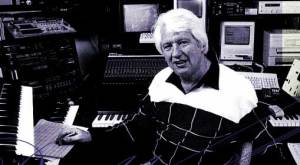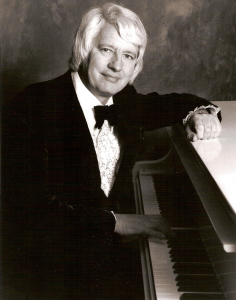Brian May, Australian Film Composer; best known scores Mad Max and Mad Max 2.
Brian May, born on July 28, 1934, in Adelaide and passing on April 25, 1997, in Melbourne at the age of 62, was a monumental figure in the Australian music and television landscapes, and as a celebrated composer of film scores.
His education at the Adelaide Elder Conservatorium equipped him with skills in piano, violin, and conducting. He joined ABC Adelaide in 1957, where he played a pivotal role in forming and conducting the ABC Adelaide Big Band, a full ensemble celebrated as the pinnacle among ABC’s state-based bands. At age 35, Brian relocated to Melbourne to take charge of the ABC’s Melbourne Show Band, making an impactful radio debut on March 13, 1969.
His pioneering efforts did not stop there. Background music for Australian television had previously been taken from records. Brian May changed this forever by writing and arranging the themes for television programmes, including Bellbird, Return to Eden, The Last Frontier, A Dangerous Life and Darling of the Gods.

His adaptation of George Dreyfus’s theme for the drama series Rush, set in the Victorian goldfields of the 19th century, achieved unprecedented success. Recorded by the Melbourne Show Band’ it soared to the top of the Australian charts with over 100,000 copies sold, a feat typically reserved for pop bands of the era.
Brian May also composed the Countdown theme, and the Melbourne Show Band launched the highly successful Countdown television series.
His departure from the ABC in 1984 marked the beginning of Brian’s illustrious career in film scoring. He composed more than 30 feature film scores, including Mad Max 1 & 2, Tales from the Crypt, Nightmare on Elm Street and Freddy’s Dead: The Final Nightmare, among others.
Brian’s commitment to personally orchestrating his scores showcased his dedication to his craft, earning him numerous accolades, such as the Australian Film Award for Best Original Score and the Golden Award from the Australian Performing Rights Association.
One of his most notable contributions was his work on the Mad Max series, where his scores for the original Mad Max and its sequel, Mad Max 2: The Road Warrior, are particularly celebrated for setting the tone for the post-apocalyptic landscape and action sequences. These scores played a significant role in defining the auditory experience of dystopian cinema and are a testament to Brian’s ability to enhance the cinematic experience through music.
Celebrated as one of Australia’s pre-eminent screen composers, Brian May’s legacy is marked not only by his achievements in composing for film and television but also by his role in revolutionizing the industry, setting new standards for original music in Australian media.
His passion for screen music and dedication to his work led him to spend many years in America, working on film scores and cementing his status as a distinguished screen composer of wide renown. Brian had a close affinity with the esteemed Buddy Baker at the University of Southern California, leading him to establish the Brian May Scholarship, primarily at that institution.
For more insights into Brian May’s illustrious career and his lasting impact on film and television music, his profiles on Film Score Monthly and IMDb offer a comprehensive look at his contributions and accolades.
https://www.filmscoremonthly.com/daily/article.cfm?articleID=2211
https://www.imdb.com/name/nm0006189/

